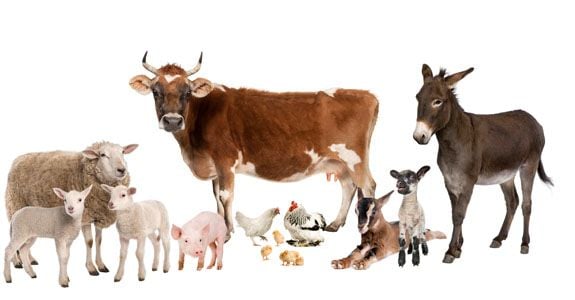Do you make any of these common mistakes with your cat?
Read more

Have you ever dreamed of one day owning a farm? Well, owning some livestock can give you the same rewarding feeling. Livestock consists of animals such as cows, pigs, sheep, goats, donkeys, horses, and mules. Whether you want an animal to provide you with fresh eggs in the morning or one to ride through your pasture, livestock animals are your best bet to give you what you are looking for.
Choosing what livestock to raise relies heavily on how much space you have, if they need fencing, how much they eat, state and local property laws, and more. You should also consider what type of veterinary care your livestock will require to avoid the spread of diseases and external parasites. Your veterinarian can recommend the best vaccinations for your livestock so they stay as healthy as possible. Continue to the articles below to learn how you should care for each livestock animal.
-
Mistakes to Avoid as a Cat Owner
Category: Newsletter Library
-
Arthritis
Category: Pet Health, Orthopedics, Pet Health
The most common type of arthritis is osteoarthritis which can be due to wear and tear on joints from over use, aging, injury, or from an unstable joint such as which occurs with a ruptured ACL (anterior cruciate ligament) in the knee. The chronic form of this disease is called degenerative joint disease
Read more -
Leptospirosis
Category: Pet Health, Diseases and Viruses, Pet Health
Leptospirosis is a serious, life-threatening disease caused by a spiral shaped bacteria. Dogs, cats, other animals and even people can be infected through exposure to urine, bite wounds, ingestion of infected flesh, or contact with contaminated soil, water and even bedding. Certain environmental conditions
Read more -
Dentistry
Category: Pet Health, Digestive and Oral Health, Pet Health
Over 85% of dogs and cats have some type of periodontal disease. Periodontal disease simply means that the gums and bone that hold the teeth in place are being destroyed by oral bacteria. This preventable disease is the number one diagnosed disease in our pets, yet many animals suffer needlessly. Periodontal
Read more -
Feline Distemper
Category: Pet Health, Diseases and Viruses
Feline distemper or feline panleukopenia is a highly contagious viral disease of kittens and adult cats caused by the feline parvovirus. It is also called panleukopenia as it affects the bone marrow and causes low white blood cell counts. It is relatively common in unvaccinated cats and is often fatal,
Read more -
Bloat and Gastric Torsion
Category: Pet Health, Digestive and Oral Health
Bloat and gastric torsion is a serious condition and your pet should be rushed to the emergency room if this occurs. Certain breeds of dogs with deep chests and narrow waists, such as hounds, bouvier des Flandres, or doberman pinschers are more susceptible to a syndrome of gastric torsion and bloat. This
Read more -
Tapeworms
Category: Pet Health, Pests and Parasites
Tapeworms live in the digestive tracts of vertebrates as adults and often in the bodies of various animals as juveniles. In a tapeworm infection, adults absorb food predigested by the host, so the worms have no need for a digestive tract or a mouth. Large tapeworms are made almost entirely of reproductive
Read more -
Seizures
Category: Pet Health, Chronic Conditions
Seizures are common in dogs, but more unusual in cats. Seizures are just symptoms which can occur with many kinds of diseases. They can happen because of diseases outside the brain or inside the brain. Low blood sugar that can happen with an overdose of insulin or with a tumor of the pancreas can cause
Read more -
Ruptured Anterior Cruciate Ligament (ACL)
Category: Pet Health, Orthopedics
The rupture of the cruciate ligament is the most common knee injury in the dog. This injury has two common presentations. One is the young athletic dog playing roughly who acutely ruptures the ligament and is non-weight bearing on the affected hind leg. The second presentation is the older, overweight
Read more -
Luxating Patella
Category: Pet Health, Orthopedics
Luxating patella is a condition where the kneecap (patella) moves out of its normal position. Luxating patella is one of the most common knee joint abnormalities of dogs, but it is only occasionally seen in cats. It may affect one or both of the knees. In some cases it moves (luxates) towards the inside
Read more -
Canine Distemper
Category: Pet Health, Diseases and Viruses
Canine distemper is caused by a virus that is shed in bodily fluids of infected animals. The virus affects primarily the lungs, intestines, and nervous system. Symptoms of the infection can include coughing, diarrhea, vomiting, inappetance, dehydration, weight loss, seizures, and encephalitis. Secondary
Read more -
Vertigo or Old Dog Vestibular Syndrome
Category: Pet Health, Chronic Conditions
Vertigo is a syndrome in the elderly dog, which can be very frightening to the owners. The dog is suddenly afflicted with a balance problem, usually staggering, but occasionally unable to stand, and more rarely actually rolling over and over. There is a tilting of the head to one side and nystagmus,
Read more -
Salmonella
Category: Pet Health, Diseases and Viruses
Salmonella is a bacterium that can cause disease in humans, dogs, cats, and other animals. It can cause a variety of symptoms, commonly vomiting and/or diarrhea, but also severe infections and septicemia. It can also cause abscesses, meningitis, bone infections, and abortion. Salmonella is found worldwide
Read more -
Roundworms
Category: Pet Health, Pests and Parasites
There are many types of roundworms, but some of the most common are intestinal parasites of dogs, cats, and raccoons. Puppies are frequently born with roundworms, and kittens can be infected via the mother's milk or feces. Adult roundworms are ivory colored, four to six inches long, and round (not flat
Read more -
Rabies
Category: Pet Health, Diseases and Viruses
Rabies is a fatal viral infection that is transmitted primarily through bite wounds. Skunks, bats, raccoons, and foxes are the primary carriers. Rabies is also fatal to humans, there has been only one case of a person surviving rabies when treatment was started after clinical signs were present. Puppies
Read more -
Parasites
Category: Pet Health, Pests and Parasites
There are many types of parasites that are found in the GI tract of cats and dogs. Worms such as roundworms, whipworms, and hookworms are very common in almost all parts of the world. These parasites shed their infective eggs in the pet's stool and contaminate the environment; some eggs can live on yards
Read more
Location
Find us on the map
Burlingame Veterinary Clinic
8511 SW Terwilliger Blvd.
Portland, OR, United States

